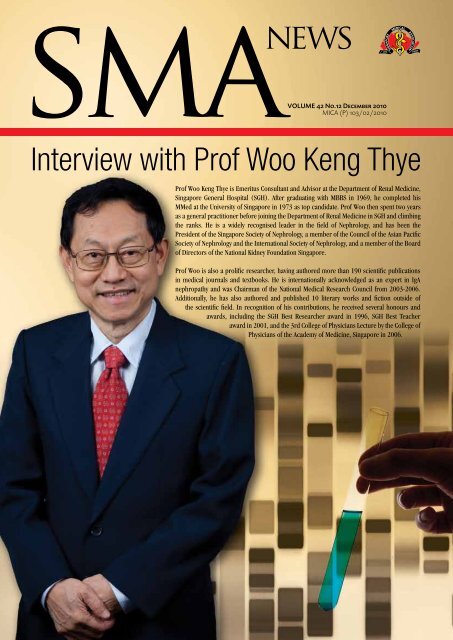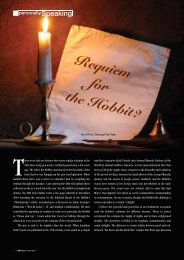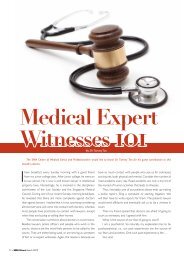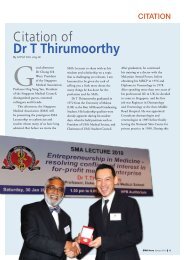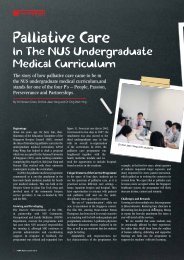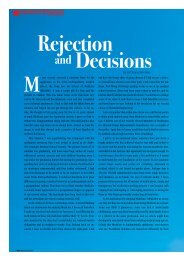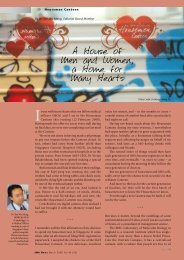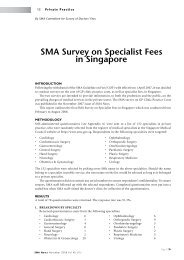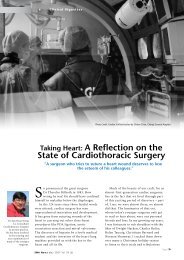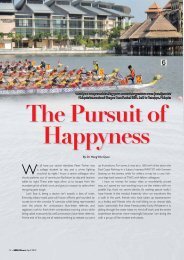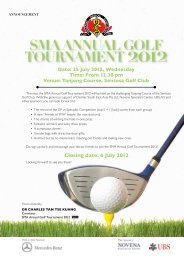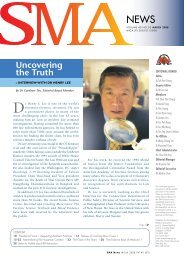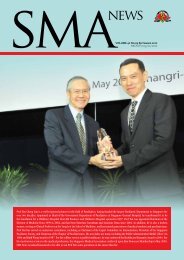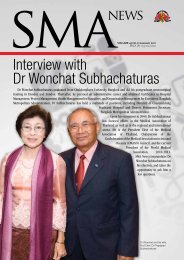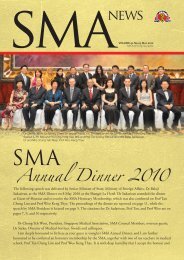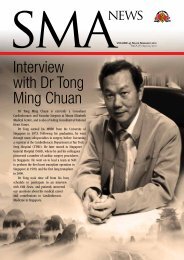Interview with Prof Woo Keng Thye - SMA News - Singapore ...
Interview with Prof Woo Keng Thye - SMA News - Singapore ...
Interview with Prof Woo Keng Thye - SMA News - Singapore ...
Create successful ePaper yourself
Turn your PDF publications into a flip-book with our unique Google optimized e-Paper software.
VOLUME 42 No.12 December 2010<br />
MICA (P) 103/02/2010<br />
<strong>Interview</strong> <strong>with</strong> <strong>Prof</strong> <strong>Woo</strong> <strong>Keng</strong> <strong>Thye</strong><br />
<strong>Prof</strong> <strong>Woo</strong> <strong>Keng</strong> <strong>Thye</strong> is Emeritus Consultant and Advisor at the Department of Renal Medicine,<br />
<strong>Singapore</strong> General Hospital (SGH). After graduating <strong>with</strong> MBBS in 1969, he completed his<br />
MMed at the University of <strong>Singapore</strong> in 1973 as top candidate. <strong>Prof</strong> <strong>Woo</strong> then spent two years<br />
as a general practitioner before joining the Department of Renal Medicine in SGH and climbing<br />
the ranks. He is a widely recognised leader in the field of Nephrology, and has been the<br />
President of the <strong>Singapore</strong> Society of Nephrology, a member of the Council of the Asian Pacific<br />
Society of Nephrology and the International Society of Nephrology, and a member of the Board<br />
of Directors of the National Kidney Foundation <strong>Singapore</strong>.<br />
<strong>Prof</strong> <strong>Woo</strong> is also a prolific researcher, having authored more than 190 scientific publications<br />
in medical journals and textbooks. He is internationally acknowledged as an expert in IgA<br />
nephropathy and was Chairman of the National Medical Research Council from 2003-2006.<br />
Additionally, he has also authored and published 10 literary works and fiction outside of<br />
the scientific field. In recognition of his contributions, he received several honours and<br />
awards, including the SGH Best Researcher award in 1996, SGH Best Teacher<br />
award in 2001, and the 3rd College of Physicians Lecture by the College of<br />
Physicians of the Academy of Medicine, <strong>Singapore</strong> in 2006.
VOLUME 42<br />
NO.12 DECEMBER 2010<br />
EDITORIAL BOARD<br />
EDITOR<br />
Dr Toh Han Chong<br />
DEPUTY EDITOR<br />
Dr Tan Yia Swam<br />
MEMBERS<br />
<strong>Prof</strong> Chee Yam Cheng<br />
Dr Martin Chio<br />
A/<strong>Prof</strong> Daniel Fung<br />
Dr Hsu Liyang<br />
Dr Jayant V Iyer<br />
Dr Lim Boon Leng<br />
Dr Jeremy Lim<br />
Dr Tan Poh Kiang<br />
Dr Tan Wu Meng<br />
Dr Teo Eng Swee Cuthbert<br />
EX-OFFICIOS<br />
Dr Chong Yeh Woei<br />
Dr Abdul Razakjr Omar<br />
EDITORIAL EXECUTIVE<br />
Ms Gracia Ong<br />
The views and opinions expressed in all the articles<br />
are those of the authors. These are not the views<br />
of the Editorial Board nor the <strong>SMA</strong> Council unless<br />
specifically stated so in writing. The contents of<br />
the <strong>News</strong>letter are not to be printed in whole or in<br />
part <strong>with</strong>out prior written approval of the Editor.<br />
Published by the<br />
<strong>Singapore</strong> Medical Association,<br />
Level 2, Alumni Medical Centre,<br />
2 College Road, <strong>Singapore</strong> 169850<br />
Tel: 6223 1264<br />
Fax: 6224 7827<br />
Email: news@sma.org.sg<br />
URL: http://www.sma.org.sg<br />
<strong>SMA</strong> Reg. No.: ROS 198/59 TAP<br />
For classified advertisements, professional<br />
announcements and other advertising enquiries,<br />
please contact <strong>SMA</strong>.<br />
Feature<br />
<strong>Interview</strong> <strong>with</strong><br />
<strong>Prof</strong> <strong>Woo</strong> <strong>Keng</strong> <strong>Thye</strong><br />
<strong>SMA</strong>: You have worked for almost seven<br />
years as an Medical Officer, then a GP before<br />
subspecialising in renal medicine. How has this<br />
contributed to your growth and maturity as a<br />
doctor?<br />
PROF WOO KENG THYE - WKT: When I was a<br />
medical student, I always told my classmates<br />
that when I graduated, I would work for a<br />
number of years in a hospital and then set up a<br />
clinic as a GP in my hometown in Ipoh in order<br />
to earn a lot of money. I did my housemanship<br />
in Ipoh General Hospital, got married in<br />
the latter part of my housemanship, and was<br />
posted to the surgical unit of Kluang Hospital.<br />
I grew to like surgery although it was hard<br />
work <strong>with</strong> long hours operating in a district<br />
hospital <strong>with</strong> my boss, an Anglo Indian, Mr TNC<br />
Roe who also doubled up as Obstetrician and<br />
Gynecologist. We did everything that could be<br />
resolved <strong>with</strong> a scapel.<br />
Then a newly qualified MRACP was posted<br />
to the hospital as a Physician came into my life.<br />
He was Dr Wong Chong Wah, still burning <strong>with</strong><br />
knowledge after his MRACP examination in<br />
Australia and the first thing he did was to set<br />
up the Kluang Study Group. He approached me<br />
several times to join his group. I told him I did<br />
not want to study, as I was happy operating and<br />
wanted to gain some more experience before<br />
setting up my own clinic as a GP. He was very<br />
persistent and one day I succumbed. I was<br />
impressed <strong>with</strong> the group. Half of them were<br />
GPs. It was in 1970 and they seemed to be so<br />
enthusiastic and knowledgable and it put me<br />
to shame. I realised how little I knew about<br />
Medicine since my MBBS days and decided to<br />
join the group to upgrade myself. Soon I too<br />
wanted study for the membership exam while<br />
the GPs were geared towards the MCGP exam<br />
also held in <strong>Singapore</strong> then. I became Dr Wong’s<br />
disciple after his former disciple left to work<br />
for Datuk Lim Kee Jin (LKJ) in Johor Bahru<br />
General Hospital (GHJB). The Post Graduate<br />
Medical Centre in GHJB was the Mecca of<br />
Medicine in Malaysia at that time. There one<br />
could receive training from Datuk Lim and<br />
when judged to be suitably trained would be<br />
allowed to take the exam in <strong>Singapore</strong>. But<br />
one had to come highly recommended and be<br />
interviewed by LKJ before acceptance into his<br />
training programme.<br />
After an apprenticeship of two years <strong>with</strong><br />
Dr Wong, he told me I had to go to LKJ if I<br />
wanted to pass the exam as there was nothing<br />
much more he could teach me so I had a year’s<br />
training <strong>with</strong> LKJ and passed the MMed Exam in<br />
1973. He knew what was required for the exam<br />
and would train his candidates like racehorses<br />
<strong>with</strong> “lots of sand papering”. He would not<br />
allow you to sit for the exam unless he thought<br />
you were ready.<br />
After working in JB <strong>with</strong> LKJ for another six<br />
months after passing my exam, I returned to<br />
Kluang to join an old friend Dr Henry Chan’s<br />
private practice where I was to work as a<br />
specialist GP earning $3000 a month, compared<br />
to an MO’s salary of $1100 in JB. Initially I was<br />
elated <strong>with</strong> the huge salary increase but after<br />
a year of seeing coughs and colds most of the<br />
time <strong>with</strong> the occasional referral of a problem<br />
consultation where I charged $36 instead of<br />
the standard $12, I grew disenchanted and<br />
suffered from boredom. I missed the lively<br />
discussions and debate, which I could obtain<br />
in hospital practice.<br />
But during the 18 months as a GP, one<br />
was exposed to the many vicissitudes of life.<br />
I learnt very quickly the harsh realities of<br />
poverty and sickness on children and families<br />
who did not earn much tapping rubber in the<br />
estates, drunken husbands and wife beaters or<br />
gamblers who did not provide for the family. I<br />
also learned about unscrupulous doctors and<br />
their brand of medical practice, the quacks<br />
and the charlatans. I learnt to be charitable,<br />
waived consultation fees, gave away medicine<br />
and sometimes even gave cash to poor patients<br />
who did not have enough to feed their family.<br />
I enjoyed the many house calls I made to<br />
patients’ homes where I could see how they<br />
lived, the poor and the rich. It was like a page<br />
out of AJ Cronin’s book, The Citadel. But in the<br />
end I knew that private practice was not meant<br />
for me. I could not visualise myself growing<br />
old and prosperous <strong>with</strong> a rotund figure in<br />
the years ahead. I had matured in the way I<br />
viewed the world but I felt that my own practice<br />
of Medicine might be rotting and the longer I<br />
stayed, even though the money was good, the<br />
<strong>SMA</strong> <strong>News</strong> december 2010 | 3
Feature<br />
more difficult it would be for me to extricate<br />
myself because of the financial attraction.<br />
At the end of GP practice, I obtained a<br />
job in <strong>Singapore</strong> where I was posted by Dr<br />
Andrew Chew, then DMS, to the Department<br />
of Renal Medicine under Dr Lim Cheng Hong<br />
in 1975. In those days, renal medicine was in<br />
its infancy. My starting salary as a specialist<br />
renal MO then was $1250 a month. However,<br />
the money I earned was not enough to feed<br />
my family, wife and two young daughters.<br />
Fortunately, I had amassed about $30,000<br />
from my GP practice and <strong>with</strong> this money<br />
I had to supplement the household and<br />
living expenditure of $1450 as we suffered<br />
a shortfall of $200 a month. But I was happy<br />
living in <strong>Singapore</strong> and so was my family.<br />
When Dr Andrew Chew posted me to<br />
work under Dr Lim Cheng Hong at the<br />
Department of Renal Medicine, he gave me<br />
the chance to specialise in nephrology. My<br />
MMed in internal medicine was for me only<br />
a passport to subspecialty training. After a<br />
few months’ exposure to nephrology working<br />
<strong>with</strong> Dr Lim, I told him that I would like to<br />
do the FRACP in nephrology, which would<br />
require a training period of three years. The<br />
training would require a period in Australia.<br />
He agreed to be my supervisor and obtained<br />
a fellowship in Australia for me to train <strong>with</strong><br />
<strong>Prof</strong>essor Priscilla Kincaid Smith who was<br />
then the foremost nephrologist in Australia<br />
and the President of the Australasian College<br />
of Physicians who also happened to be a good<br />
friend. Dr Lim was an inspiring mentor and<br />
provided me <strong>with</strong> whatever support I needed.<br />
Under his tutelage I acquired the basic skills<br />
in renal medicine including dialysis and renal<br />
transplantation. The College stipulated that<br />
trainees had to spend six months to acquire<br />
basic laboratory research experience and Dr<br />
Lim granted me protected time to do research<br />
in immunology <strong>with</strong> <strong>Prof</strong> Chan Soh Har at the<br />
WHO Research Laboratories at MacAlister<br />
Road. This crucial step also established my<br />
research career. Today, the department owes<br />
much of its research reputation to the foresight<br />
of Dr Lim. When the department was set up, he<br />
had provided for renal research laboratories.<br />
He himself was interested in research and<br />
knew its importance as nephrology was then<br />
a young science and much was required in<br />
order to advance our knowledge. I benefitted<br />
from his vision and was able to help build<br />
the research infrastructure in the department<br />
after I returned from Australia <strong>with</strong> a sure and<br />
confident style.<br />
After my return from Melbourne, <strong>Prof</strong> Seah<br />
told me, “Now that you have been trained,<br />
you must remain to serve the people and not<br />
Those were the days when we had to play God, as those we<br />
accepted into the dialysis programme would live. Dialysis<br />
places were very few then and many had to die. In deciding<br />
who gets into the programme, we had to be fair and not<br />
favour any particular patient or doctor taking care of the<br />
patient because all our patients must be treated equally.<br />
So if we have to play God, we should be a good God.<br />
4 | <strong>SMA</strong> <strong>News</strong> december 2010<br />
think of going into private practice again.”<br />
My response at that time was that I would stay<br />
for a long time, as long as my services were<br />
needed. Since then, I have not looked back on<br />
my career and just moved steadily ahead and<br />
eventually grew old in the field, chronologically<br />
and nephrology-wise.<br />
<strong>SMA</strong>: What are your feelings on the residency<br />
programme?<br />
WKT: For a chap like myself, having the<br />
good fortune of staying in two medical units,<br />
under the close mentoring of two dedicated<br />
physicians, both helping to shape me for a<br />
career in Medicine and the following three<br />
years of specialisation in Nephrology again<br />
under the mentorship of Dr Lim Cheng Hong,<br />
<strong>Prof</strong> Seah Cheng Siang and <strong>Prof</strong> Kincaid<br />
Smith, I believe that even in those days, my<br />
own traineeship was akin to the present day<br />
residency programme of five years <strong>with</strong>in a<br />
single department/hospital. I would therefore<br />
subscribe to it. However, the present<br />
residency is undergoing the phase where<br />
there are teething problems. It will need<br />
much supervision and support from staff and<br />
authorities involved in the system.<br />
<strong>SMA</strong>: What words of wisdom do you wish to<br />
impart especially to medical students and<br />
junior doctors now?<br />
WKT: Datuk Wong Chong Wah once told me,<br />
“When drinking, always remember the fountain.”<br />
Dr Lim Cheng Hong taught me two<br />
principles; the first being, “Be humble if you do<br />
not know and do not pretend that you do.” It<br />
is only when you acknowledge your ignorance<br />
that you will make progress. Secondly, he<br />
taught me, “Be fair to your patients and<br />
colleagues.” Those were the days when we<br />
had to play God, as those we accepted into the<br />
dialysis programme would live. Dialysis places<br />
were very few then and many had to die. In<br />
deciding who gets into the programme, we had<br />
to be fair and not favour any particular patient<br />
or doctor taking care of the patient because all<br />
our patients must be treated equally. So if we<br />
have to play God, we should be a good God.<br />
<strong>Prof</strong> Seah Cheng Siang once told me:<br />
“Humility is the hallmark of a great man. The<br />
greater he is, the humbler he becomes.”<br />
<strong>SMA</strong>: Over your career, what do you think are<br />
some key differences in the management of<br />
renal patients?<br />
WKT: In the early 1970s many patients <strong>with</strong> end<br />
stage renal failure had to die because facilities<br />
for dialysis were very limited. Very few people<br />
received kidney transplants.<br />
Today we are in much happier<br />
circumstances, largely because of the National<br />
Kidney Foundation (NKF) and the Kidney<br />
Dialysis Foundation, which provide most of the<br />
dialysis facilities for many of our needy patients.<br />
Since 1987, <strong>with</strong> the passage of the Human<br />
Organ Transplant Act we could harvest about<br />
50 kidneys a year for kidney transplantation;<br />
before this we averaged only about 5 kidneys<br />
yearly. The options for various forms of kidney<br />
transplants have also grown wider. The law<br />
now allows living donor transplants between<br />
spouses, good friends and Samaritans in<br />
addition to those from parents and siblings.<br />
The NKF has set aside a fund of 10 million<br />
dollars for donor expenses and compensation<br />
plus insurance cover should anything go amiss<br />
during the transplant operation/donation.<br />
<strong>SMA</strong>: Can you recount to us the early years of<br />
<strong>Singapore</strong> nephrology?<br />
WKT: Haemodialysis in <strong>Singapore</strong> started in<br />
1961 when a patient <strong>with</strong> acute renal failure<br />
was dialysed using the twin coil artificial
kidney. In 1968, a chronic haemodialysis<br />
programme was established in the <strong>Singapore</strong><br />
General Hospital (SGH). In 1975, the first selfdependency<br />
dialysis unit (SDDU) was set up<br />
in Alexandra Hospital and in 1983 the second<br />
SDDU was set up in Tan Tock Seng Hospital.<br />
These are the subsidised state-supported<br />
haemodialysis programmes where patients<br />
were dialysed <strong>with</strong> the help of their spouses or<br />
relatives. In 1981, <strong>with</strong> the opening of the new<br />
SGH, a new dialysis centre was set up there.<br />
This remains as the main dialysis centre today,<br />
and patients <strong>with</strong> problems on dialysis at the<br />
National Kidney Foundation Centres or other<br />
centres are referred, including those requiring<br />
renal transplant workup.<br />
Continuous Ambulatory Peritoneal Dialysis<br />
(CAPD) was introduced in 1980 when five<br />
patients were enrolled in the programme. In<br />
1987, a CAPD unit was established in SGH to<br />
provide an integrated approach to patient<br />
training, management and education. By 1996,<br />
there were close to 400 patients in SGH and<br />
the National University Hospital. The peritonitis<br />
rate used to be about one in 27 patient months.<br />
Today <strong>with</strong> technical advances the peritonitis<br />
rate is one in 48 patient months. CAPD is an<br />
equally viable alternative to haemodialysis.<br />
Renal transplantation remains the ideal<br />
renal replacement therapy. The first cadaveric<br />
renal transplant in <strong>Singapore</strong> was performed<br />
in July 1970. Living related donor transplant<br />
has been performed since 1976. Since 1985,<br />
cyclosporine A was introduced and this has<br />
resulted in better transplant survival rates. The<br />
Medical Therapy, Research and Education Act<br />
was passed in Parliament in 1972. Under this<br />
Act, individuals can pledge or will their kidneys<br />
for transplant purposes in the event of death.<br />
Relatives of the deceased can also give consent<br />
for kidneys to be retrieved for transplantation.<br />
But until 1987, the average number of kidneys<br />
obtained was only five a year. Faced <strong>with</strong> this<br />
shortage of cadaver kidneys, the Human Organ<br />
Transplant Act (HOTA) was implemented in<br />
1988 and has resulted in a dramatic increase<br />
in the yield of cadaver kidneys.<br />
The bulk of the clinical service work<br />
is in the area of clinical nephrology <strong>with</strong><br />
glomerulonephritis constituting the major<br />
portion. Asymptomatic haematuria and<br />
proteinuria is the commonest presentation<br />
for patients <strong>with</strong> glomerulonephritis. This<br />
group of patients we now know have IgA<br />
nephritis, which is the most common form<br />
of glomerulonephritis seen in <strong>Singapore</strong><br />
and overseas. It is to the credit of the first<br />
generation nephrologists in <strong>Singapore</strong> that<br />
two years after the founding of the <strong>Singapore</strong><br />
Society of Nephrology, they organised the<br />
First Asian Colloquium in November 1974.<br />
The papers published included those on<br />
glomerulonephritis, urinary tract infection,<br />
acute renal failure, haemodialysis and renal<br />
transplantation.<br />
<strong>SMA</strong>: What are some of the exciting frontiers<br />
of nephrology?<br />
WKT: The three main pillars of in the practice<br />
of nephrology are in clinical nephrology,<br />
dialysis and renal transplantation. For clinical<br />
nephrology, we can now detect many types of<br />
kidney diseases at a very early stage and offer<br />
treatment before the disease causes harm. For<br />
those <strong>with</strong> established kidney disease, kidney<br />
damage and renal failure, we can now offer<br />
treatment to arrest the progression. For those<br />
<strong>with</strong> mild renal failure we can even reverse the<br />
situation <strong>with</strong> drugs currently available.<br />
Feature<br />
In the field of dialysis,<br />
what is awaited for most eagerly by many<br />
patients on dialysis is the Automated Wearable<br />
Artificial Kidney (AWAK). AWAK technology was<br />
incorporated in 2007 and dedicated to the<br />
development of wearable artificial kidneys. It<br />
was jointly founded by Dr Gorden Ku (Chairman<br />
of Kidney Dialysis Foundation) and the two<br />
chief scientists and inventors, <strong>Prof</strong> David Lee<br />
and Dr Martin Roberts from UCLA, USA. AWAK<br />
is based on the technique of peritoneal dialysis<br />
and sorbent based regeneration of used<br />
dialysate. It is both bloodless and waterless<br />
and provides round the clock dialysis and<br />
ultrafiltration, and represents the ultimate<br />
form of frequent dialysis, which provides a<br />
steady state of metabolic and fluid regulation.<br />
It weighs about two pounds and is battery<br />
<strong>SMA</strong> <strong>News</strong> december 2010 | 5
Feature<br />
operated.<br />
In renal transplantation, a big taboo area<br />
of ABO incompatibility has now been bypassed<br />
<strong>with</strong> the latest technology for removal of ABO<br />
antibodies by plasma exchange and newer<br />
methods of immunomodulation. Many more<br />
patients can now be transplanted. In fact over<br />
the past five to six years, most of the barriers<br />
of transplantation, including the one pertaining<br />
to the elderly donor and recipient, have been<br />
surmounted. As long as the patient is fit and<br />
does not have significant comorbidities,<br />
patients in their seventies can now receive<br />
or even donate under the “Old for Old Renal<br />
Transplantation Programme” which was first<br />
initiated in the USA and is now practiced in<br />
most established renal transplant centres.<br />
This is as it should be, considering the aging<br />
population <strong>with</strong> many renal patients surviving<br />
into their eighties.<br />
<strong>SMA</strong>: Can you give us an insight into your role<br />
in the management of glomerulonephritis,<br />
and why medical research is important for the<br />
healthcare sector in <strong>Singapore</strong>?<br />
WKT: At the very beginning of my career as a<br />
nephrologist, I had always been interested<br />
in research. This was especially relevant in a<br />
young science like nephrology where many<br />
things were still largely unknown and treatment<br />
for many forms of kidney diseases were very<br />
empirical, more based on gut feeling rather<br />
than evidence. From 1976, <strong>with</strong>out fail, every<br />
year I had been successful in getting at least<br />
$1000 for research from the Medical Clinical<br />
Research Committee (MCRC). Its main role<br />
was to grant licenses for the conduct of clinical<br />
trials but it also had a purse of $100,000 a year<br />
for supporting medical research in the form<br />
of small research grants of $1000 to $2000<br />
annually. The accounting was very stringent<br />
and every dollar spent was scrutinised as the<br />
officers were civil servants and were more than<br />
bureaucratic. Subsequently, <strong>with</strong> the setting<br />
up of the Department of Clinical Research by<br />
the Ministry of Health, I was able to get close<br />
to $10,000 a year for research and later on<br />
research was made easier as there were other<br />
sources of funding from the hospital’s research<br />
committee, cluster research and finally the<br />
National Medical Research Council. From 1976<br />
<strong>with</strong> yearly funding for research, I was able to<br />
pursue my research work on IgA nephritis,<br />
which has remained my passion for the past<br />
three decades and more.<br />
Clinical research was made much easier<br />
for me as my boss Dr Lim had already provided<br />
6 | <strong>SMA</strong> <strong>News</strong> december 2010<br />
for renal laboratories <strong>with</strong> our own dedicated<br />
scientist Dr Lau Yeow Kok and laboratory<br />
technicians. I had a firm foundation in research<br />
methods from my early days spent <strong>with</strong> <strong>Prof</strong><br />
Chan Soh Har and subsequently during my stint<br />
in Melbourne <strong>with</strong> <strong>Prof</strong> Kincaid Smith and <strong>Prof</strong><br />
Judith Whitworth.<br />
I also ensured that my junior colleagues<br />
were similarly given training locally and<br />
overseas so that they could engage in clinical<br />
research to find new cures for various diseases<br />
through clinical trials of their research<br />
findings. I was glad to have mentored many of<br />
them in both research and clinical work and<br />
set up various research cum clinical teams to<br />
achieve better treatment of our patients.<br />
It is necessary for doctors to be engaged<br />
in clinical research because what we learn in<br />
medical school very soon becomes outdated.<br />
Clinical research enables a doctor to find<br />
answers to his clinical problems. These<br />
answers may result in better treatment and<br />
cures for his patients. Research will help to<br />
keep our doctors at the forefront of Medicine.<br />
The healthcare sector in <strong>Singapore</strong> is very<br />
much involved in clinical research as part of<br />
the government’s initiative to grow a culture<br />
of translational research <strong>with</strong>in the scientific<br />
and medical community. The goal is to make<br />
<strong>Singapore</strong> a clinical hub <strong>with</strong> translational<br />
research as the focus, and doctors from the<br />
healthcare clusters are involved as clinician<br />
scientists and clinical investigators.<br />
<strong>SMA</strong>: Even as a great pioneer of <strong>Singapore</strong><br />
nephrology, who were your own mentors in<br />
this field?<br />
WKT: My first mentor in nephrology was Dr Lim<br />
Cheng Hong. He set high standards from the<br />
beginning. He inspired the vision to achieve<br />
and emulate the renowned overseas centres<br />
of excellence. He knew what was good for us<br />
and how to enable me to go over to harvest<br />
the goodies and return home and set them up<br />
in our centre. Dr Lim was very interested in<br />
research and wanted me to do research. That<br />
was the start of my research career.<br />
The other good thing that Dr Lim did was<br />
to send me to train <strong>with</strong> <strong>Prof</strong>essor Priscilla<br />
Kincaid Smith, the foremost nephrologist in<br />
Australia at the Royal Melbourne Hospital.<br />
With the special hands on intensive training for<br />
one year under <strong>Prof</strong> Kincaid Smith and her able<br />
I tell myself that life is short and there are lots I would like<br />
to do. I compress my time and my day so you can stretch<br />
it out like an accordion, which means time management<br />
and priorities are of paramount importance. Ironically,<br />
you must firstly tell yourself that you are not Superman<br />
and cannot achieve or have everything. You cannot go into<br />
great depth as well as have broad based knowledge all the<br />
time for everything; you will crash or go bonkers. You have<br />
to learn to focus on the essentials.<br />
Deputy, <strong>Prof</strong> Judith Whitworth, my third mentor<br />
in nephrology, I returned to <strong>Singapore</strong> <strong>with</strong> a<br />
broad based knowledge and a renal philosophy<br />
which certainly provided me <strong>with</strong> the necessary<br />
knowledge and clinical skills to develop<br />
nephrology in our relatively young renal centre<br />
at that time. I was able to train and impart<br />
my skills to those who came after me. The<br />
department gained strength and grew in time to<br />
become what it is today. Judith, herself a skilled<br />
researcher in nephrology also provided me<br />
<strong>with</strong> research training and facilities. Through<br />
her, I also acquired a strong foundation for<br />
clinical research which I was able to further<br />
strengthen on my return to <strong>Singapore</strong>.<br />
<strong>SMA</strong>: You were the Chairman of the Psychology<br />
Club in school, and that your short stories have<br />
a distinct psychological slant – any thoughts<br />
before in training to be a psychiatrist?<br />
WKT: My ambition in life was to be a doctor<br />
and a writer. Initially, I thought that if I were<br />
to become a doctor, then I wanted to become<br />
a psychiatrist. In my dreams, I often had vivid<br />
imaginings of myself analysing a patient on a<br />
couch under hypnosis. As a sixth former in<br />
school, I wrestled the post of Chairman from<br />
another sixth former who was from the Arts<br />
stream. I was from the Science stream and the
Arts people had been running the club for years.<br />
I won the election by a very narrow margin and<br />
during my Chairmanship, introduced many new<br />
ideas to revamp the activities of the club <strong>with</strong><br />
much appeal.<br />
Years later, when I began my writing more<br />
seriously as a third year medical student, I often<br />
added a twist at the end of the story followed by<br />
a psychological or clinical explanation. I had<br />
discovered even then that human actions <strong>with</strong><br />
their weird and unexpected happenings often<br />
have a psychological basis. I have always been a<br />
great fan of Freud and Jung.<br />
I never became a psychiatrist. But my eldest<br />
daughter, Bernardine is a child psychiatrist.<br />
Perhaps I influenced her unconsciously. My<br />
younger daughter Geraldine is a musician but I<br />
am not musically inclined. Her gift came from<br />
my wife.<br />
<strong>SMA</strong>: You have achieved so much – having a<br />
distinguished medical career, well published<br />
in medical and literary fields, and raising a<br />
great family – how did you manage to juggle<br />
everything?<br />
WKT: I tell myself that life is short and there<br />
are lots I would like to do. I compress my time<br />
and my day so you can stretch it out like an<br />
accordion, which means time management<br />
and priorities are of paramount importance.<br />
Ironically, you must firstly tell yourself that<br />
you are not Superman and cannot achieve<br />
or have everything. You cannot go into great<br />
depth as well as have broad based knowledge<br />
all the time for everything; you will crash or<br />
go bonkers. You have to learn to focus on the<br />
essentials. This is where my training in poetry<br />
is very useful, because you have to be sparse<br />
<strong>with</strong> words and yet remain precise and poetic<br />
<strong>with</strong> maximum impact for imagery. It would<br />
also mean that you must sleep well and have<br />
frequent breaks for planning and envisioning.<br />
Meditation is most helpful. And always be<br />
prepared to sacrifice and learn to be content<br />
<strong>with</strong> just a taste or a small sampling of anything,<br />
like tasting wine <strong>with</strong>out swallowing or puffing<br />
on a pipe or cigar <strong>with</strong> little inhalation. Then<br />
you can go the distance.<br />
But the most important factor in my success<br />
is my supportive wife who has been a wonderful<br />
mother to our two children, and grandmother<br />
to our two granddaughters. For me, she has<br />
also been my advisor and confidante all these<br />
years. She shouldered the hefty burden of<br />
raising the children and managing the family<br />
so as to allow me to do my work.<br />
<strong>SMA</strong>: Which five books would you bring to a<br />
deserted island, air-con study room provided<br />
of course.<br />
WKT: I am always hungry for books, especially<br />
second hand ones. On my last trip to Ipoh, I<br />
went to my usual haunt at Novel Hut in Jusco<br />
and bought 31 second or umpteen hands old<br />
novels for 80 ringgit. Eight of them were old<br />
Westerns or cowboy novels <strong>with</strong> two by Louis<br />
L’Amour and two by JT Edson. Contentment<br />
can be bought very cheaply if you know how<br />
and have simple taste. Most people would just<br />
borrow books from our public libraries but<br />
they do not stock old books. They have some<br />
out of print books on diskettes though.<br />
I would bring along the following:<br />
(i) Collected poetry of T S Eliot, in particular,<br />
I would love to read again the Wasteland<br />
and Ash Wednesday which I consider his<br />
two best poems.<br />
(ii) The Old Man and the Sea by Ernest<br />
Hemingway. I love the style forming<br />
mastery of the English language (these are<br />
words from his Nobel prize for literature<br />
citation). I have memorised many passages<br />
of his book. The first paragraph is the most<br />
beautiful, and reads so melodiously, like a<br />
song.<br />
(iii)The collected short stories of Guy de<br />
Maupassant. I consider him a French<br />
genius who writes <strong>with</strong> great passion.<br />
He was a great lover of women and such<br />
a gentleman. He understood their true<br />
nature well.<br />
(iv) The collected short stories (Malayan and<br />
Borneo stories) of Somerset Maugham. For<br />
me, he was the greatest short story writer.<br />
His best short story in my opinion is Rain. I<br />
would have awarded him the Nobel Prize for<br />
literature or at least the Pulitzer prize.<br />
(v) Use Enough Gun by Robert Ruark. He<br />
was the author of UHURU on Hunting Big<br />
Game. He was a skillful hunter and story<br />
teller. His gun and camera were used as<br />
background material for his novels.<br />
Since my African safari, I have become<br />
interested in African writers and one of them<br />
is Wilbur Smith, a renowned writer from South<br />
Africa. His novels are action packed like a<br />
cowboy or Western.<br />
<strong>SMA</strong>: What would constitute a great meal for you?<br />
WKT: In Ipoh, it is a must for me to have a<br />
meal at Mun Choong Seafood Restaurant in<br />
Pasir Pinji. My meal would usually begin <strong>with</strong><br />
a bowl of fish lips boiled <strong>with</strong> crab meat. This<br />
Feature<br />
is followed by large freshwater prawns cooked<br />
in two different styles, steamed <strong>with</strong> ginger, and<br />
cooked in black sauce.<br />
Next would be a fresh lam khor yee<br />
(freshwater carp) done to perfection, the flesh<br />
very smooth and sweet <strong>with</strong> the texture just<br />
right. Then, a break <strong>with</strong> a large plate of baby<br />
kai lan fried <strong>with</strong> shallots. This is the equivalent<br />
of the sherbet in a Western meal.<br />
Then comes the yim coked hai, crabs<br />
baked in salt. The flesh is sweet and succulent<br />
and not too salty <strong>with</strong> the charateristic smoky<br />
flavour.<br />
In between there must be generous sips of<br />
Chinese tea. My favourite is ching nin heong or<br />
a Thousand Year Fragrance. This is not available<br />
from the restaurant, and one must bring it in.<br />
Finally we have the chiew pai noodle. This is<br />
the restaurant’s signature noodles in hakka<br />
style.<br />
I would also like a dessert of red bean<br />
paste <strong>with</strong> a glutinous peanut dumpling but<br />
that’s available in another restaurant called Kok<br />
<strong>Thye</strong>. However, if one is game, one can have a<br />
delicious bowl in the hawker centre at <strong>Woo</strong>ley’s<br />
in Ipoh Garden, but <strong>with</strong>out the dumpling.<br />
And the crowning glory after such a meal<br />
must be followed by the enjoyment of the flavour<br />
of Henri Wintermann Number 2 cigar. Flavour<br />
in cigar terms is “the intermingled sensation<br />
of taste and aroma” sensed in the tongue and<br />
palate but pleasurised in the cerebral cortex.<br />
Sadly, restaurants in Malaysia do not allow<br />
smoking and I can only enjoy this in the comfort<br />
of my own room shut off from my family. My<br />
grand daughters will tell me, “Grandpa, you will<br />
have black lungs if you smoke.”<br />
<strong>SMA</strong>: Thank you, <strong>Prof</strong> <strong>Woo</strong>.<br />
<strong>SMA</strong> <strong>News</strong> december 2010 | 7


